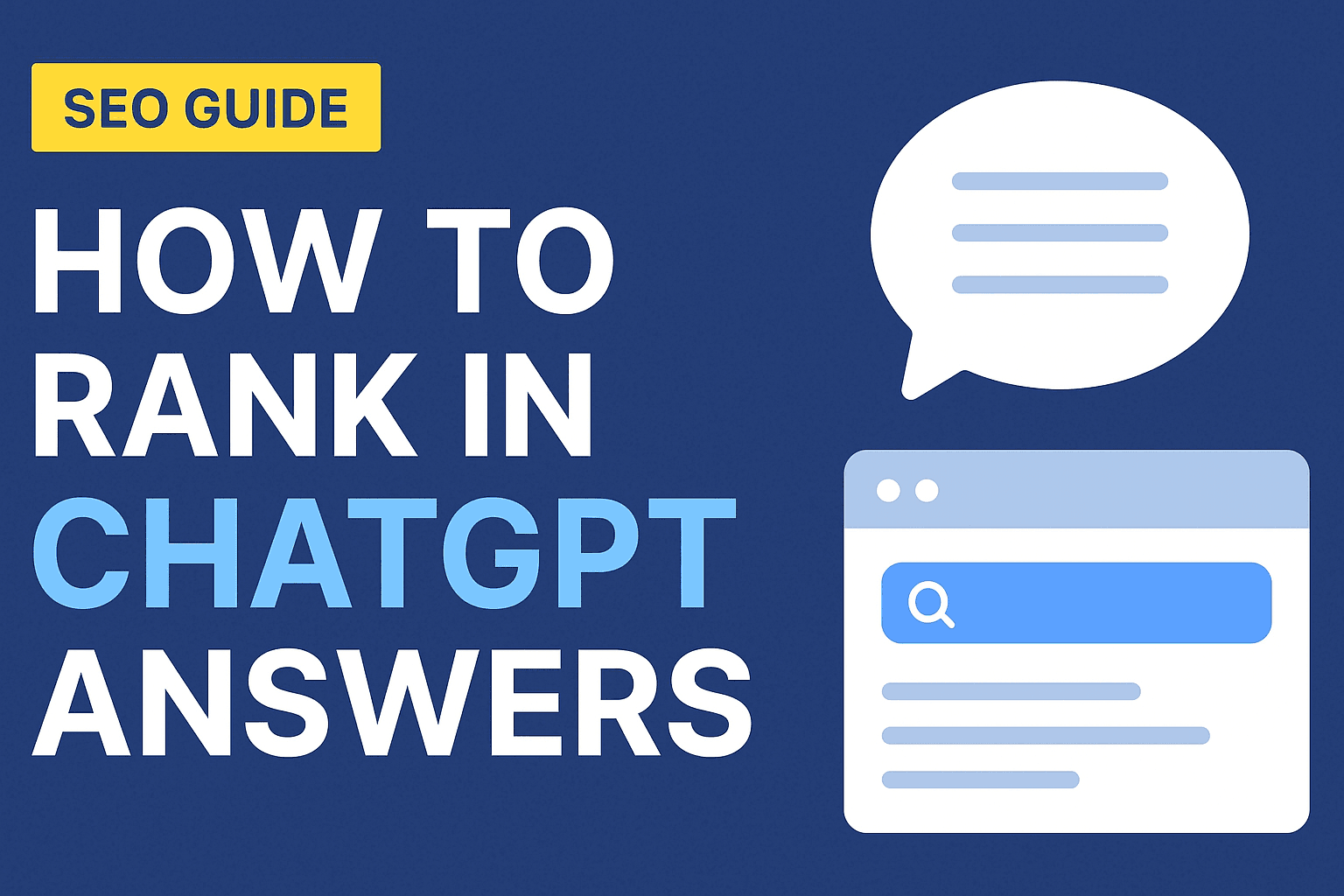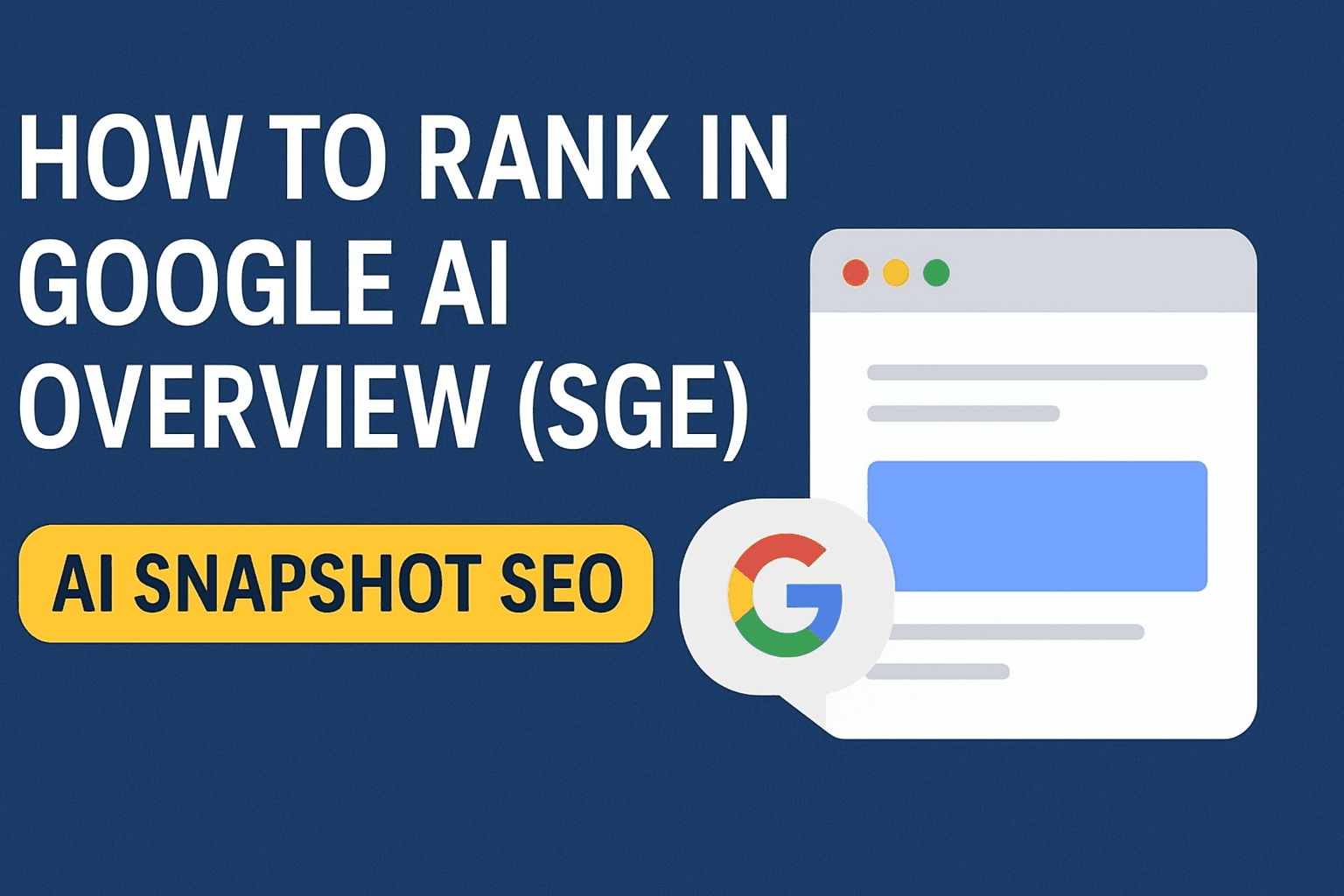How to Rank in ChatGPT Answers: The Complete Guide to ChatGPT SEO

The rise of ChatGPT has changed how people discover and consume information online. Instead of typing a short query into Google, millions of users now ask ChatGPT questions and receive detailed, conversational answers. For businesses, publishers, and SEO professionals, the question is obvious: how can you rank in ChatGPT answers?
This guide explores the foundations of ChatGPT SEO, explains how Bing + ChatGPT search works, examines the role of plugins and data sources, and gives practical strategies to improve your chances of being cited in ChatGPT search results.
1. Why Ranking in ChatGPT Answers Matters
1.1 The Shift to Conversational Search
Search is no longer just about blue links. With AI-powered assistants like ChatGPT, Perplexity, and Google's AI Overview, users expect direct, summarized, and conversational answers.
1.2 Traffic and Visibility from ChatGPT
While ChatGPT doesn't behave like Google with a SERP full of links, it increasingly cites sources, especially when browsing or integrated with Bing. Appearing in these answers means:
- Brand visibility when your site is quoted directly.
- Referral traffic when users click the citation link.
- Authority building, as being cited signals trustworthiness.
1.3 ChatGPT as a New Search Gateway
OpenAI has partnered with Microsoft to integrate Bing Search inside ChatGPT. For many users, ChatGPT is their search engine. Optimizing for ChatGPT is therefore an extension of modern SEO.
Want to see if your content ranks in ChatGPT?
Try our ChatGPT visibility audit and see if your content is being cited in AI responses.
2. How ChatGPT Generates Answers
To optimize for ChatGPT, it's crucial to understand where its answers come from.
2.1 Training Data vs. Real-Time Browsing
- Training Data (knowledge cutoff): ChatGPT was trained on massive amounts of data up to a certain date (currently 2023 for GPT-4). That means some answers come from historical knowledge rather than live web crawling.
- Bing Integration: With browsing enabled, ChatGPT queries Bing to find up-to-date answers, then summarizes and sometimes cites the sources.
2.2 Plugins and Extensions
For premium users, ChatGPT plugins and the new GPTs (custom AI assistants) expand capabilities. Some plugins can fetch live data from external sources (like Expedia or WolframAlpha). While not a direct ranking factor, integration with plugins increases chances of your site being surfaced if your data is well-structured and relevant.
2.3 Citations and Sources
Unlike its training-based answers, when ChatGPT browses the web it often includes clickable citations. This is where ChatGPT SEO becomes real: your goal is to be one of those cited sources.
How ChatGPT Selects Sources
Training Data
Based on content available before knowledge cutoff date
Bing Search
Real-time web results when browsing is enabled
Plugins
Custom data sources through approved integrations
Citations
Links to authoritative sources in browsing mode
3. Principles of ChatGPT SEO
3.1 Visibility Through Bing Search
Since ChatGPT browsing uses Bing as its backend, optimizing for Bing SEO is essential.
- Ensure your content is indexed in Bing Webmaster Tools.
- Focus on clarity and structured answers, as Bing often surfaces concise, factual sources.
- Target long-tail conversational queries that users are likely to ask in natural language.
3.2 Write for Conversational Queries
ChatGPT users phrase questions more naturally than in Google. For example:
- Instead of "ChatGPT SEO," they might ask: "How do I rank in ChatGPT answers?"
- Instead of "best CRM software," they'll type: "What's the best CRM for small businesses in 2025?"
To optimize:
- Include FAQs with full-sentence questions.
- Use natural language headings like "How to rank in ChatGPT answers."
- Write in a clear, explanatory style.
3.3 E-E-A-T Still Matters
Even in AI-driven results, Experience, Expertise, Authoritativeness, and Trustworthiness (E-E-A-T) play a role. ChatGPT favors citing:
- Content written by identifiable experts.
- Sites with strong backlink authority.
- Pages with factually accurate and verifiable claims.
3.4 Structured Content Wins
ChatGPT scans for structured, easy-to-parse answers. To help:
- Use H2/H3 subheadings with descriptive titles.
- Add bullet points and numbered lists for clarity.
- Use schema markup for FAQs, articles, and how-to content.
- Keep paragraphs short and scannable.
Want to optimize your content for ChatGPT?
Our AI-friendly audit tool can analyze your content and suggest improvements.
Get Your Free AI Audit4. How to Increase Chances of Being Cited by ChatGPT
4.1 Create Definitive Content
ChatGPT prefers to cite clear, authoritative sources. You increase your chances of being quoted if your content is:
- Comprehensive but easy to digest.
- Updated frequently.
- Written in a neutral, informative tone.
4.2 Use Data, Studies, and Original Insights
AI models already "know" generic definitions. To stand out:
- Publish original research or unique statistics.
- Share case studies and practical examples.
- Offer actionable frameworks (step-by-step guides).
4.3 Optimize for Featured Snippets (Google + Bing)
There is overlap between optimizing for featured snippets and ChatGPT SEO.
- Provide direct answers to questions.
- Use concise definitions and summaries.
- Include tables, charts, and comparisons.
4.4 Build Bing-Friendly Backlinks
Since ChatGPT browsing relies on Bing, backlinks indexed in Bing have stronger weight.
- Submit site to Bing Webmaster Tools.
- Build citations from news outlets, blogs, and forums that Bing crawls frequently.
4.5 Engage With Plugins and APIs
If your niche allows, provide API access or integrations that ChatGPT plugins can tap into. For example:
- A weather site with a real-time API.
- A finance site with stock data feeds.
ChatGPT Visibility
See how your content performs in ChatGPT results compared to competitors.
5. Common Misconceptions About ChatGPT SEO
5.1 "It's Impossible to Rank in ChatGPT"
False. While you can't directly "submit" to ChatGPT, you can optimize your site so Bing and OpenAI's browsing mode cite your content.
5.2 "ChatGPT Doesn't Send Traffic"
Partially true. While some answers don't include links, browsing-enabled ChatGPT does cite sources. In many industries, these citations can drive targeted, high-quality traffic.
5.3 "You Only Need to Optimize for Google"
Outdated thinking. ChatGPT uses Bing, and platforms like Perplexity also pull from multiple engines. Ignoring Bing SEO means ignoring AI-driven search visibility.
6. Future of ChatGPT Search Results
6.1 Deeper Integration with Bing
Expect ChatGPT to become more intertwined with Bing search, providing more frequent and consistent citations.
6.2 Paid Placement or Sponsored Answers
As monetization evolves, businesses may one day pay for preferred placement in AI answers. Being an authority early helps future-proof your position.
6.3 Multi-Modal Search
With GPT-4o and future models, expect answers that mix text, images, and voice. Optimizing for multi-format content (text + infographics + transcripts) will matter.
6.4 AI as the Default Search Engine
Within the next few years, many users will start with ChatGPT instead of Google. Businesses that adapt now will capture visibility before the competition.
Frequently Asked Questions
Conclusion: Winning at ChatGPT SEO
Ranking in ChatGPT answers is about adapting SEO for a conversational, AI-first world. By focusing on Bing visibility, structured content, authority, and unique insights, you can improve your chances of being cited in ChatGPT search results.
Just as traditional SEO evolved with Google updates, ChatGPT SEO will continue to change as AI search expands. The key is to adapt early, experiment, and make your content the kind of source AI assistants want to cite.
The age of AI search has begun. Will your content be part of the answers?
About the Author

Riadh Mahieddine
AI SEO Specialist

